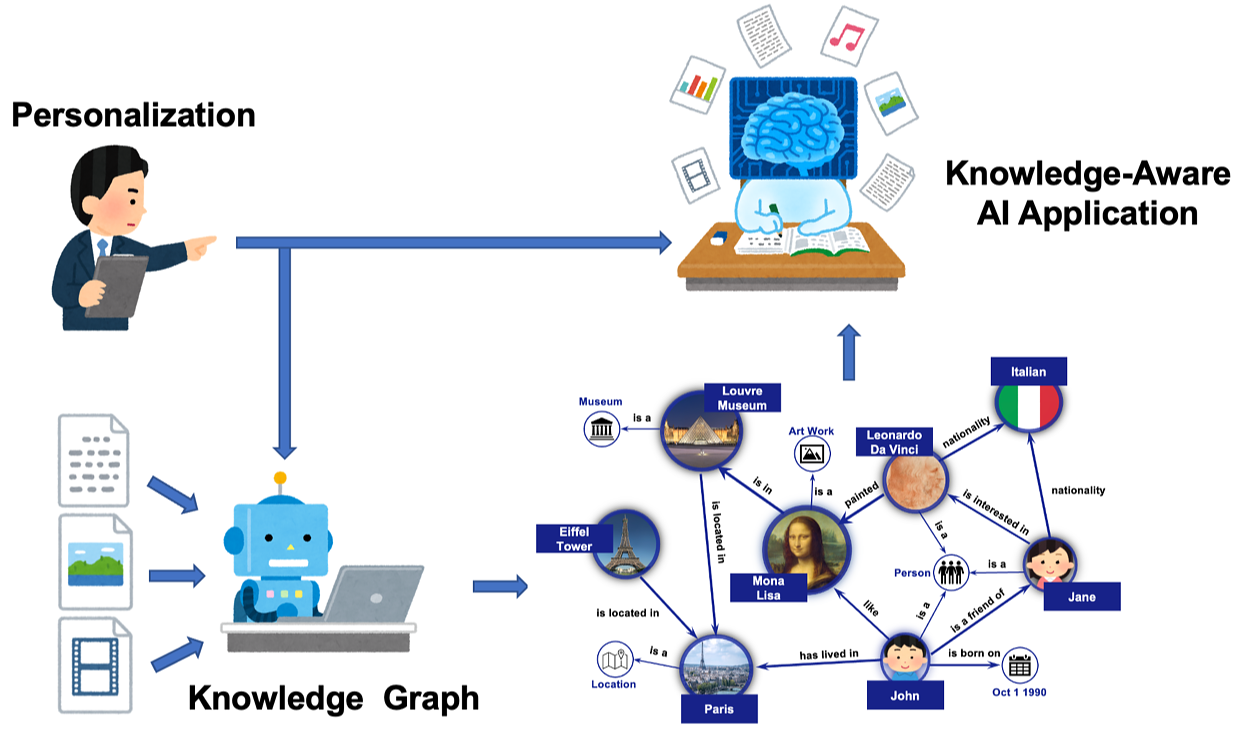
KnOWLab: Towards Knowledge-Aware AI Systems
Knowledge Graph Laboratory
Senior lecturer:KERTKEIDKACHORN Natthawut
E-mail:
[Research areas]
Knowledge Graph, Natural Language Processing, Machine Learning
[Keywords]
Language Model, Knowledge Acquisition and Representation, Ontology, Graph Machine Learning, Recommendation System, Financial NLP
Skills and background we are looking for in prospective students
We welcome highly motivated students who are passionate about building AI with human-like capabilities. Preferred: (a) Basic knowledge of linear algebra, probability, statistics, and algorithms and (b) Experience in programming, particularly in Python.
What you can expect to learn in this laboratory
Students will understand how to develop knowledge-aware AI and will be able to implement it to solve practical problems based on their interests. To achieve this, they will learn state-of-the-art techniques in a wide range of research fields, including 1) knowledge graphs (knowledge acquisition, representation, and reasoning), 2) natural language processing, and 3) machine learning. They will then combine knowledge from these research areas to develop their own research problems and find solutions. Eventually, students will learn to write academic papers and practice presentation skills. Throughout these activities, students can expect to develop AI research skills, critical thinking, and communication skills for their future careers.
【Job category of graduates】 AI Industry and Information Technology Industry
Research outline

Figure: Research themes
Our laboratory specializes in knowledge-aware AI techniques. Developing a human-like AI system requires AI to have the ability to efficiently create, process and utilize real-world knowledge. Knowledge-aware AI, also known as knowledge-enhanced AI, integrates structured world knowledge into machine learning models, enabling them to reason, predict, and learn with greater accuracy and understanding. There are three main research themes in our lab:
Knowledge Graph
A knowledge graph (KG) is a structured representation of real-world entities and their relationships. The research in this theme focuses on three areas:
1) Knowledge Acquisition: We develop methods to extract and integrate knowledge from various sources, including unstructured data (e.g., text and images) and semi-structured data (e.g., tabular data), using machine learning and natural language processing techniques to build knowledge graphs.
2) Knowledge Representation and Reasoning: Our focus is on Knowledge Graph Completion (KGC). KGC involves predicting missing entities or relationships in a KG. In KGC, we develop techniques to learn the representation of entities and relationships in the vector space (KG Embedding) and then perform link prediction to discover new or missing knowledge.
3) Knowledge Graph Management: We aim to develop techniques and the framework for constructing, integrating, updating, verifying, and validating knowledge in a KG to manage the knowledge lifecycle.
Knowledge-Aware AI Application
We focus on developing knowledge-aware AI applications, including but not limited to Question Answering, Chatbots, Knowledge Discovery, and Natural Language Understanding across various domains such as Finance and Biomedical Sciences. In Finance, our interests include stock price prediction and portfolio management. In Biomedical Sciences, our focus areas are drug discovery, pathway prediction, and more. Building knowledge-aware AI applications involves:
1) Knowledge Modeling: we develop methods to model real-world knowledge using various techniques including KG embeddings and graph neural networks.
2) Knowledge Injection: we develop a framework to inject external knowledge into machine learning techniques.
Personalization
We focus on developing personalization applications, including personal assistants, sentiment analysis, and recommendation systems, by capturing and integrating human preferences into AI applications. We study various techniques, such as deep learning, prompt engineering, human-in-the-loop, and reinforcement learning.
Key publications
- Kertkeidkachorn N., Nararatwong R., Ichise R. "UWKGM: A Modular Platform for Knowledge Graph Management." Proceedings of the 29th ACM International Conference on Information & Knowledge Management. 2020.
- Pornprasit C. Liu X., Kertkeidkachorn N., Kim S., Noraset T., Tuarob S. "Convcn: A CNN-based Citation Network Embedding Algorithm towards Citation Recommendation." Proceedings of the ACM/IEEE joint conference on digital libraries in 2020.
- Kertkeidkachorn N., Shirai K., "Sentiment Analysis using the Relationship between Users and Products." Findings of the Association for Computational Linguistics: ACL 2023.
Equipment
GPU Server
CPU/GPU Cluster Machines
Teaching policy
To support students, we conduct various activities, including one-on-one discussions, laboratory research meetings, and reading group seminars. These activities aim to enhance AI research skills, critical thinking, and presentation abilities. Our laboratory promotes a global research environment by communicating in English and encouraging international collaborations. I will do my best to unlock the potential in students by supporting their interests and connecting them with leading experts in their fields.
[Website] URL : https://www.jaist.ac.jp/is/labs/k-natthawut